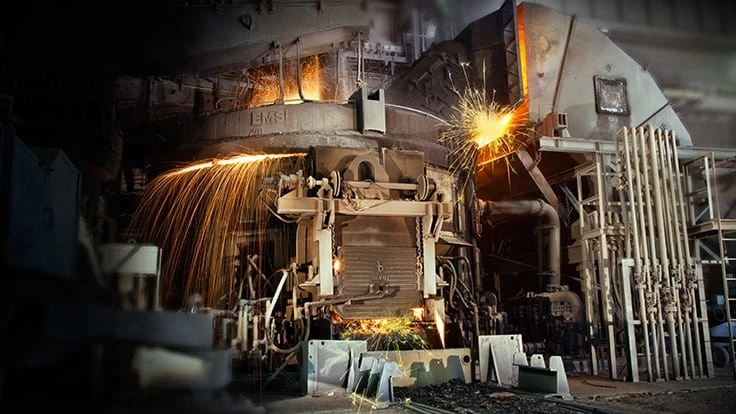
Photo courtesy of Nucor
Leon Topalian, president and CEO of electric arc furnace (EAF) steelmaker Nucor Corp., Charlotte, North Carolina, said cleaner and greener steel is a must for the steel industry. Despite the challenging global market for steel currently, he said the future is “primed to be a time for true opportunity for the global steel industry.”
Topalian spoke during Steel Success Strategies, which was hosted online by Fastmarkets Metal Bulletin in partnership with World Steel Dynamics Oct. 26-28. He noted that when the conference was introduced in 1985, it was named Steel Survival Strategies. “It wouldn’t surprise me to find out that people would think 2020 is a great year to revive that name.”
Despite the challenges arising from the COVID-19 pandemic, Topalian said room remained to talk about the industry’s successes in 2020 and how companies like Nucor are optimizing for the future success of the industry.
EAFs accounted for one-third of U.S. steel production in 1985, while they now account for two-thirds of U.S. steel production and will soon account for one-third of global steel production. He added that EAFs have evolved to be able to produce almost all the automotive grades previously supplied by the domestic integrated mills.
Nucor has nine projects worth more than $4 billion planned to expand the company’s reach and capabilities, Topalian said. These projects are focused on three goals: expanding Nucor’s range of value-added products for the automotive market, improving the performance of its businesses that serve the construction markets and producing 97 percent of the plate products demanded by the U.S. market, he said.
The company’s Brandenburg, Kentucky, mill is Nucor’s biggest investment by far, Topalian said, adding that the mill provides Nucor with a geographic advantage in serving Midwest.
Nucor is investing $1.7 billion in a steel plate manufacturing plant in Brandenburg. According to a news release from Kentucky Gov. Andy Beshear’s office, the 1.5 million-square-foot mill in the Buttermilk Falls Industrial Park along the Ohio River will provide Nucor with 1.2 million tons of steel plate production capacity annually.
Access to the Ohio River will enable Nucor to supply the mill with direct-reduced iron and ferrous scrap by barge that it will melt in its EAF, leveraging Kentucky’s competitive electrical rates. From the center of the U.S. manufacturing corridor, Nucor Steel Brandenburg will be able to cost-effectively distribute plate products to customers regionally and nationwide, according to the news release.
Additionally, the company recently completed Phase I of an $826 million expansion project at its Nucor Steel Gallatin mill in Ghent, Kentucky. That mill, which produces flat-rolled steel coils, is now in the middle of Phase II of the expansion.
During his Steel Success Strategies presentation, Topaliam described the Trump administration’s position on trade and introduction of Section 232 tariffs on steel imports as necessary, adding that the U.S. has been “besieged by imports driven by overcapacity. As a result of the tariffs, Topalian said steel imports declined and domestic production recovered to levels in 2019 not seen since 2012-2014.
However, he continued, global excess steel capacity has not reduced, and these measures must remain in place. Topalian said the issue was more than a China problem, with U.S. allies having been among the most aggressive exporters during this period. “The ability to produce steel at home is at the heart of each country’s national security.”
Topalian said the steel industry needs to take a more active role in sustainability and climate change discussions, adding that EAFs make companies like Nucor some of the “most efficient and cleanest steel producers in the world.” Seventy percent of American produced steel is made in EAFs, he continued, with structural steel containing 93 percent recycled content. The growth of EAF steelmaking in the U.S. has led to a 45 percent reduction in the industry’s carbon footprint over the last 40 years, with Topalian adding the industry’s CO2 emissions will continue to shrink as the energy grid becomes greener.
Topalian said he “rejects the aspiration to return to normal” after the pandemic, instead saying he wants Nucor to be “better in every aspect of our business.”
Latest from Recycling Today
- BMW Group, Encory launch 'direct recycling’ of batteries
- Loom Carbon, RTI International partner to scale textile recycling technology
- Goodwill Industries of West Michigan, American Glass Mosaics partner to divert glass from landfill
- CARI forms federal advocacy partnership
- Monthly packaging papers shipments down in November
- STEEL Act aims to enhance trade enforcement to prevent dumping of steel in the US
- San Francisco schools introduce compostable lunch trays
- Aduro graduates from Shell GameChanger program





